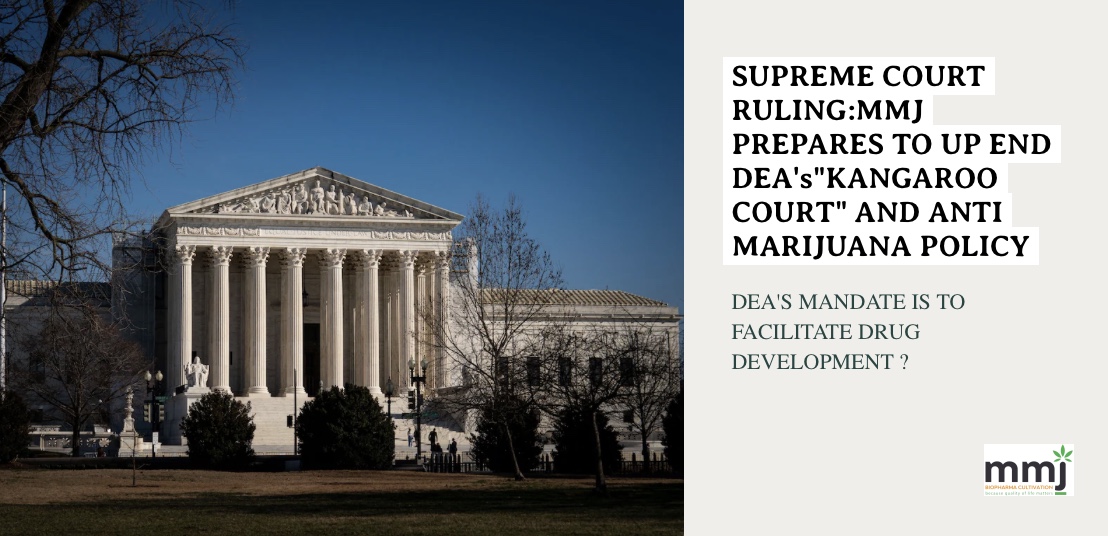Duane Boise, President of MMJ BioPharma Cultivation, stated, "I think most Americans want judges who don't mind telling the truth and don't mind saying we're wrong. Unlike the DEA's arrogant attitude of, if we make a mistake, we won't be called on it, however MMJ is doing exactly that. The most immature thing you can do is say, 'no, no, I didn't make a mistake.' The mature thing to do, that all adults learn to do in this country is to say, 'oops, that was a mistake. I'm going to fix it. I'm sorry.'"
WASHINGTON, D.C., 3683 / ACCESSWIRE / July 8, 2024 / In a recent landmark decision, the U.S. Supreme Court overturned the 40-year-old Chevron doctrine, which historically granted federal agencies significant leeway in interpreting ambiguous statutes. This ruling has profound implications for regulatory bodies, including the Drug Enforcement Administration (DEA), and will affect ongoing cases such as MMJ BioPharma Cultivation's legal battle against the DEA.

UNDERSTANDING CHEVRON DEFERENCE
The Chevron case from 1984 involved the Environmental Protection Agency (EPA) and the interpretation of "stationary source" under the Clean Air Act, which was ambiguous in its definition. The Supreme Court at the time decided that courts should defer to agency interpretations of ambiguous statutes, provided the interpretation was reasonable. This deference allowed agencies like the DEA to wield significant power in making and enforcing rules based on their interpretations of statutory ambiguities.
IMPACT OF THE SUPREME COURT'S LATEST DECISION
The Supreme Court's recent ruling challenges this deference, particularly affecting how agencies like the DEA operate. In the specific case of MMJ BioPharma Cultivation, this decision could invalidate the DEA's use of administrative law judges (ALJs) and push for DEA actions to be handled in federal courts, ensuring the right to a jury trial as emphasized in the Jarkesy v. SEC case.
MMJ BIOPHARMA CULTIVATION VRS DEA
MMJ BioPharma Cultivation has faced prolonged delays from the DEA in obtaining a Bulk Manufacturing registration for growing pharmaceutical-grade marijuana. The company's president, Duane Boise, and its legal team argue that the DEA's internal processes and administrative rulings have unfairly hindered their research and development efforts.
HISTORICAL CONTEXT: CHEVRON and DEA ADMINISTRATIVE LAW
Historically, the Chevron doctrine allowed agencies to interpret ambiguous statutory provisions, effectively making them judge, jury, and executioner. This approach often resulted in courts deferring to the agencies' expertise in complex scientific and technical matters. However, critics argue that this deference led to regulatory overreach and diminished the role of courts in interpreting laws.
MODERN CHALLENGES: THE FISHERMAN'S CASE
A recent case involving fishermen in the Pacific underscores the implications of Chevron deference. The agency required fishermen to have federal observers on their boats to monitor catches, an intrusion that also mandated the fishermen to bear the costs. The statute was silent on who should pay for these observers, but the agency's interpretation imposed the financial burden on the fishermen, demonstrating how agencies could exploit statutory ambiguities to their advantage.
IMPLICATIONS FOR DEA
With Chevron deference now curtailed, agencies like the DEA will face increased legal challenges. Tim Moynahan, MMJ's chair, emphasized that the companies can now argue that the DEA's restrictive policies lack statutory backing and challenge them in federal courts.
BROADER IMPACT ON CANNABIS POLICY
The ruling also affects broader cannabis policy, particularly the rescheduling of marijuana under federal law. Josh Schiller of Boies Schiller noted that this decision could lead to more legal challenges against rescheduling efforts, potentially stalling progress. Boies expressed concerns that the DEA would adopt a more cautious approach, slowing down regulatory changes and impacting the cannabis industry's growth.
Duane Boise, President of MMJ BioPharma Cultivation, stated, "I think most Americans want judges who don't mind telling the truth and don't mind saying we're wrong. Unlike the DEA's arrigant attitude of , if we make a mistake, we won't be called on it, however MMJ is doing exactly that. The most immature thing you can do is say, 'no, no, I didn't make a mistake.' The mature thing to do, that all adults learn to do in this country is to say, 'oops, that was a mistake. I'm going to fix it. I'm sorry.'"
DEA ADMINISTRATIVE LAW SHIFT
The Supreme Court's decision to limit Chevron deference marks a significant shift in administrative law, reasserting the role of federal courts in interpreting statutes and curbing the DEA's overreach. For MMJ BioPharma Cultivation, this ruling provides a new legal pathway to challenge the DEA's anti-marijuana research policies and seek a fairer regulatory environment. The decision heralds a potential transformation in how the DEA operates, ensuring greater judicial oversight and adherence to statutory intent.
MMJ is Represented by Attorney Megan Sheahan and Associates
CONTACT:
Madison Hisey
[email protected]
203-231-8583
SOURCE: MMJ BioPharma Cultivation




